South Africa
South Africa's president Cyril Ramaphosa chaired Tuesday (Nov. 21) a virtual Extraordinary Joint Meeting of BRICS nations on the situation in the Middle East.
Also joining the meeting were officials from the six nations set to join the bloc next year, namely Saudi Arabia, Argentina, Egypt, Ethiopia, Iran and the United Arab Emirates.
In the opening remarks, South Africa's president accused Hamas and Israel of violating international law, as the humatiarian crisis deepens in Gaza.
“The collective punishment of Palestinian civilians through the unlawful use of force by Israel is a war crime,” Ramaphosa said. “The deliberate denial of medicine, fuel, food and water to the residents of Gaza is tantamount to genocide.”
“In its attacks on civilians and by taking hostages, Hamas has also violated international law and must be held accountable for these actions,” the president added.
In a joint statement, the BRICS bloc urged Israel and Hamas to "exercise maximum restraint," called for "an immediate, durable and sustained humanitarian truce leading to a cessation of hostilities."
Ramaphosa also called for the deployment of a UN force "to monitor the cessation of hostilities and protect civilians."
Israel and Hamas agreed Wednesday (Nov. 22) on hostage release and a four-day truce.
What's the deal?
The agreement will bring the first respite to war-torn Palestinians in Gaza, where more than 12,000 people, many women and children, have been killed, according to health authorities. It could also offer a glimmer of hope to the agonzied families of those abducted on October 7.
The deal, brokered by Qatar, the U.S. and Egypt, was announced as fighting intensified in central neighborhoods of Gaza City.
Israeli leaders have set dual objectives — to crush Hamas and to bring the hostages home. But they have not made clear to families how they plan to balance the two.
Some of the hostage families have said they fear that the military offensive endangers their loved ones. Israeli leaders, in turn, have argued that only military pressure on Hamas will lead to some hostage releases in a possible deal involving a temporary cease-fire.
Israel this week confirmed the deaths of two hostages, and Hamas and Islamic Jihad recently published several videos of hostages who looked unwell, provoking fear and concern among many.
Which peace for Israelis and Palestinians?
Benyamin Netanyahu has been embattled at home for months due to affairs in court and his government's reform of the judiciary.
Following the October 7 attack, his approval ratings hit bottom rock in Israel.
Opposition Leader Yair Lapid on November 15 called on Prime Minister Benjamin Netanyahu to resign over what he called the government’s poor handling of the war against Hamas.
Lapid did not join the war cabinet established after Hamas’s October 7.
According to reports by local media prerequisites of his joining the government included the ousting of ministers Bezalel Smotrich, who leads Religious Zionism, and Itamar Ben Gvir, the leader of Otzma Yehudit.
Responding at the time, ruling Likud party slammed Lapid for his remarks, accusing him of seeking to establish a government that would "establish a Palestinian state [...] and allow the Palestinian Authority to control Gaza".
In a joint statement unveiled Tuesday (Nov.21), the BRICS bloc "reaffirmed that a just and lasting solution to the Israeli-Palestinian conflict [could] only be achieved by peaceful means."
BRICS bloc Russia said the emerging nations bloc could play “a key role” in finding a political settlement.
Putin proposed last month that Moscow could mediate in the conflict due to its relationships with both Israel and the Palestinians.




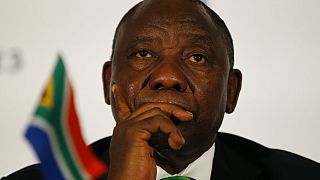
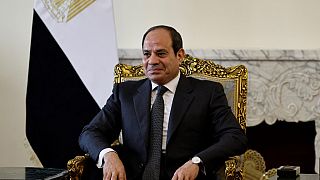
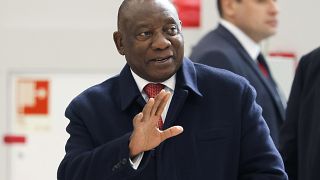
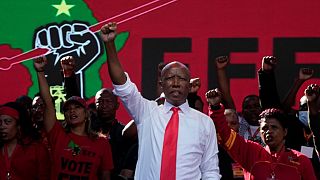
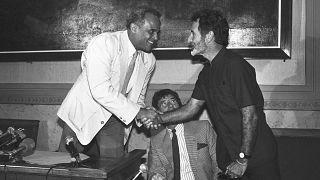
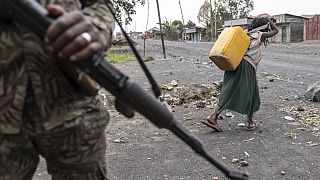
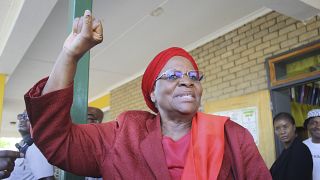
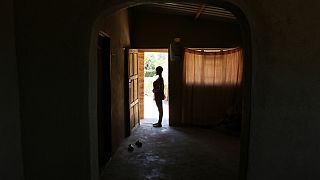
01:27
Gaza: UNRWA to halt aid delivery through the Kerem Shalom crossing
01:31
Egypt rallies for humanitarian support for Gaza
01:06
Lebanon: Clean up operations start in city of Nabatiyeh as residents return
01:31
Palestinian children line up in Gaza Strip hoping to be distributed a warm meal
01:26
Namibia: voting underway as the country gears towards new leadership
01:26
Israel civil inquiry blames Netanyahu for October 7 failures